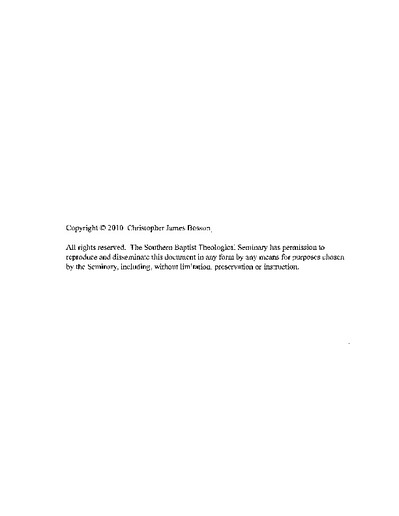A Scriptural Appraisal of the Necessary Connection between Progressive Sanctification and Compatibilist Freedom
Abstract
This dissertation proposes that a necessary connection exists between a
progressive model of sanctification and a compatibilist model of human freedom.
Chapter 1 presents the thesis, background, and methodology for the dissertation, giving
special interest to the way that compatibilism is uniquely qualified to accommodate the
necessary link between one's character and conduct intrinsic to a progressive model of
sanctification.
Chapter 2 defines and examines the two most widely held models of human
freedom: libertarianism and compatibilism. Compatibilism is shown to comport more
closely with Scripture and to solve many of the nagging philosophical problems
associated with a libertarian model of freedom.
Chapter 3 continues to build a foundation for the remaining chapters by
defining the three most widely held models of sanctification: Wesleyan perfectionism,
Keswick, and Augustinian or progressive sanctification. Here it is argued that Wesleyan
perfectionism and Keswick require a concomitant libertarian freedom, whereas an
Augustinian model of sanctification requires compatibilism.
Chapter 4 offers scriptural support for the connection between progressive
sanctification and compatibilist freedom. The central focus is on determining the biblical
author's intent and on laying the exegetical groundwork for the final chapter.
Chapter 5 argues for the necessary connection between progressive
sanctification and compatibilist freedom by questioning libertarian interpretations of the
texts examined in the previous chapter. Since it potentially bifurcates the scriptural
connection between one's character and conduct, libertarian freedom is shown to be a
poor candidate for the type of freedom necessitated by a progressive model of
sanctification.
I close, in Chapter 6, by calling Evangelicals to return to a common sense
understanding of the bounds of logic, scriptural fidelity to both God's gracious
sovereignty and man's genuine freedom, and a greater sense of mystery concerning the
nature of God.

